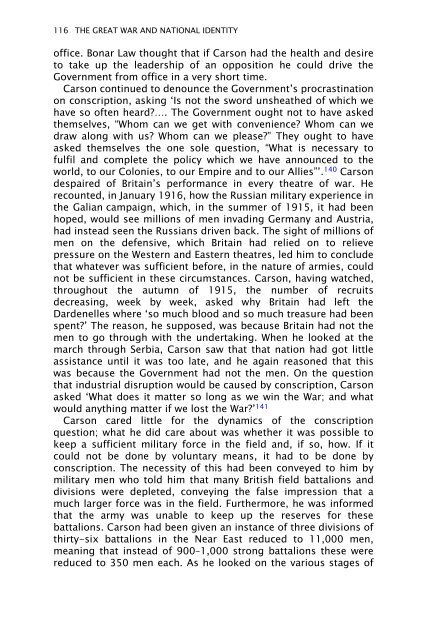Dividing Ireland: World War I and Partition
Dividing Ireland: World War I and Partition
Dividing Ireland: World War I and Partition
You also want an ePaper? Increase the reach of your titles
YUMPU automatically turns print PDFs into web optimized ePapers that Google loves.
116 THE GREAT WAR AND NATIONAL IDENTITY<br />
office. Bonar Law thought that if Carson had the health <strong>and</strong> desire<br />
to take up the leadership of an opposition he could drive the<br />
Government from office in a very short time.<br />
Carson continued to denounce the Government’s procrastination<br />
on conscription, asking ‘Is not the sword unsheathed of which we<br />
have so often heard?…. The Government ought not to have asked<br />
themselves, “Whom can we get with convenience? Whom can we<br />
draw along with us? Whom can we please?” They ought to have<br />
asked themselves the one sole question, “What is necessary to<br />
fulfil <strong>and</strong> complete the policy which we have announced to the<br />
world, to our Colonies, to our Empire <strong>and</strong> to our Allies”’. 140 Carson<br />
despaired of Britain’s performance in every theatre of war. He<br />
recounted, in January 1916, how the Russian military experience in<br />
the Galian campaign, which, in the summer of 1915, it had been<br />
hoped, would see millions of men invading Germany <strong>and</strong> Austria,<br />
had instead seen the Russians driven back. The sight of millions of<br />
men on the defensive, which Britain had relied on to relieve<br />
pressure on the Western <strong>and</strong> Eastern theatres, led him to conclude<br />
that whatever was sufficient before, in the nature of armies, could<br />
not be sufficient in these circumstances. Carson, having watched,<br />
throughout the autumn of 1915, the number of recruits<br />
decreasing, week by week, asked why Britain had left the<br />
Dardenelles where ‘so much blood <strong>and</strong> so much treasure had been<br />
spent?’ The reason, he supposed, was because Britain had not the<br />
men to go through with the undertaking. When he looked at the<br />
march through Serbia, Carson saw that that nation had got little<br />
assistance until it was too late, <strong>and</strong> he again reasoned that this<br />
was because the Government had not the men. On the question<br />
that industrial disruption would be caused by conscription, Carson<br />
asked ‘What does it matter so long as we win the <strong>War</strong>; <strong>and</strong> what<br />
would anything matter if we lost the <strong>War</strong>?’ 141<br />
Carson cared little for the dynamics of the conscription<br />
question; what he did care about was whether it was possible to<br />
keep a sufficient military force in the field <strong>and</strong>, if so, how. If it<br />
could not be done by voluntary means, it had to be done by<br />
conscription. The necessity of this had been conveyed to him by<br />
military men who told him that many British field battalions <strong>and</strong><br />
divisions were depleted, conveying the false impression that a<br />
much larger force was in the field. Furthermore, he was informed<br />
that the army was unable to keep up the reserves for these<br />
battalions. Carson had been given an instance of three divisions of<br />
thirty-six battalions in the Near East reduced to 11,000 men,<br />
meaning that instead of 900–1,000 strong battalions these were<br />
reduced to 350 men each. As he looked on the various stages of








